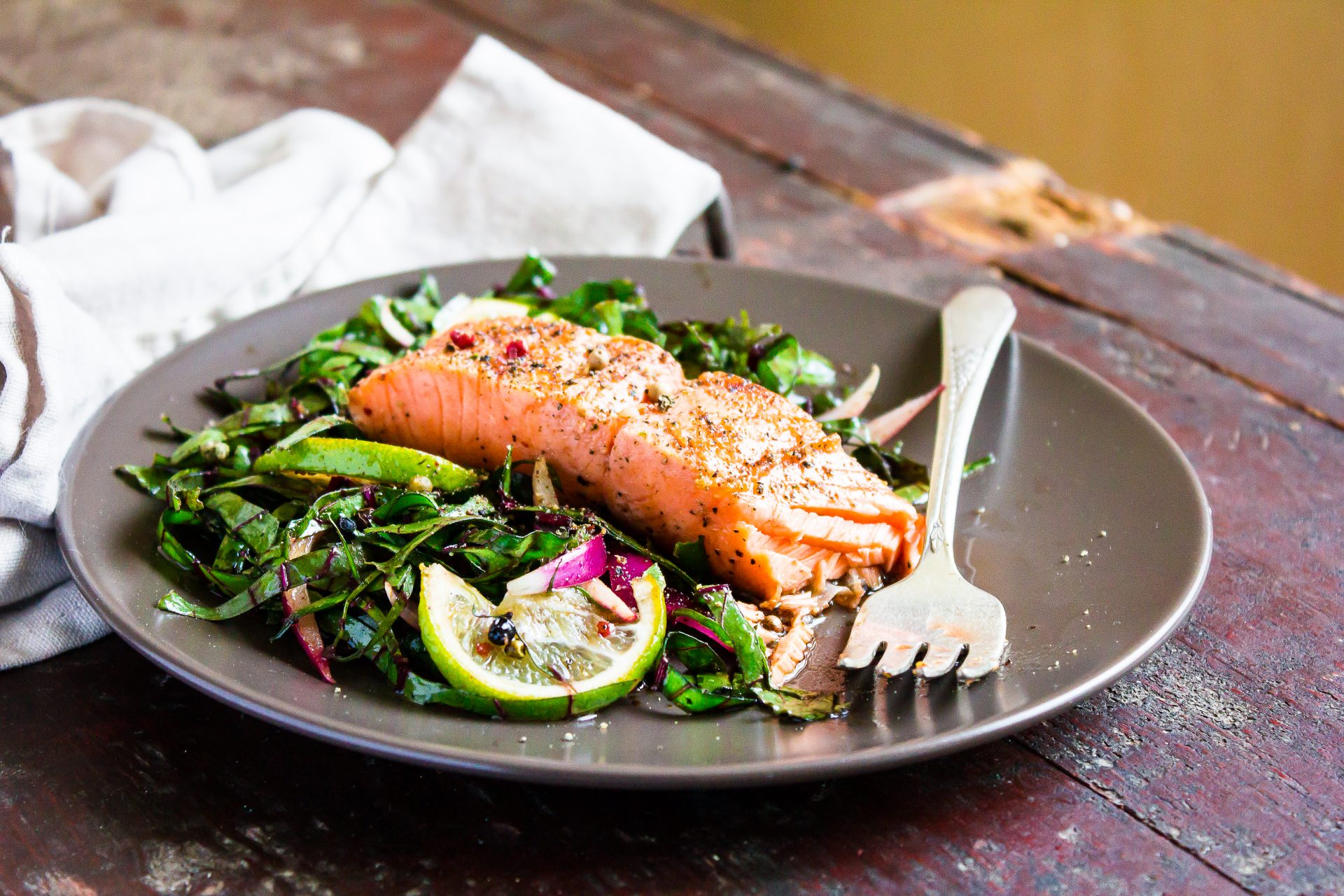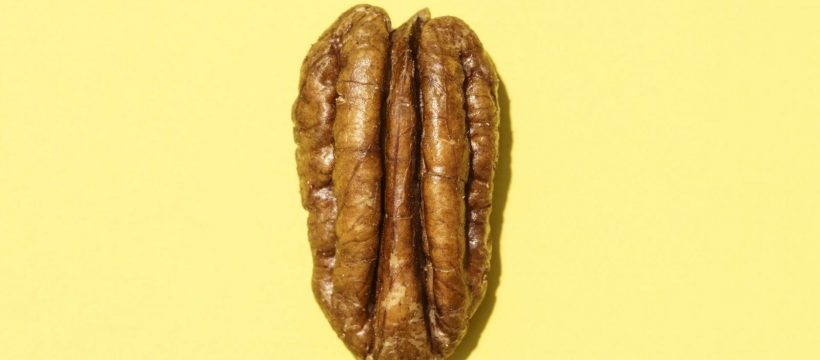Want to protect your brain for as long as possible? Grab yourself a plate of omega-3s and healthy fats straight from the Mediterranean diet.
The Mediterranean diet is thought to be one of the most nutritious ways of eating thanks to the fact that it covers all the main food groups and includes loads of anti-inflammatories and antioxidants.
Think about it: you’ve got a plate stacked with fresh fruit and veg, dashed with olive oil which is full of healthy monounsaturated fats, accompanied with fibre-rich almonds, anti-oxidant packed seeds, potassium-filled avocados and oily fish (such as grilled sardines, salmon and anchovies) that chock full of omega-3s. You’ve basically checked off all the major food groups and beneficial nutrients in one meal.
Mostly, it comes down to the omega-3-rich foods. Growing up, you might have even been nagged by your parents to take cod liver oil capsules to help with your school grades or have been forced into chowing down a plate of oily kippers at your nan’s. If so, it turns out that your family was on to something, as studies show that omega-3s can help to build muscle and protect your brain health.
What are omega-3s?
Omega-3s are polyunsaturated fatty acids – essential fats that our bodies can’t produce and which can only be accessed through food or supplementation. Their anti-inflammatory effects means that they help to maintain a healthy heart, improve mental health and can reduce muscular inflammation.
There are three main types of omega-3 fatty acids: alpha-linolenic acid (ALA), docosahexaenoic acid (DHA) and eicosapentaenoic acid (EPA). DHA and EPA tend to come from fish, seaweed and algae – so if you’re plant-based, it’s important to understand where you can get these acids from (ie spirulina supplements). Isabel Zapf, the founder of Z-Ora Nutrition, explains: “If you obtain omega-3 fatty acids only from plant sources other than algae, you need to consume much more omega-3 fatty acids to satisfy your body’s needs.”
How do omega-3s help with brain health?
Essentially, the Mediterranean diet is high in carbs, medium in fats and very low on processed food – so if you want to follow it and benefit from its muscle-loving properties, you’ve got to up your fat intake and get some omega-3s in you.
A new study has found that eating cold-water fish and other sources of omega-3 fatty acids like chia seeds and walnuts may preserve brain health and enhance thinking capacity as we age.
Published in the journal Neurology, scientists found that eating a diet rich in omega-3s while we’re young can protect our brain against common signs of ageing by the time we reach middle age. We don’t yet know why DHA and EPA protect the brain but researchers have suggested that it might be down to their anti-inflammatory properties.
“We don’t understand everything yet but (it’s proven that) if you increase your consumption of omega-3s even by a little bit, you are protecting your brain,” says Dr Claudia Satizabal, lead author of the study.
You may also like
How eating nuts can help your body deal with stress
How omega-3s make you stronger
While “working out is amazing for the body, it can also wreak havoc on your muscles and joints if you don’t take the proper precautions – such as eating all the right nutrients,” Zapf continues.
“Nutrients help repair the damage that occurs during exercise (such as helping to rebuild muscles). Omega-3, EPA and DHA contain long-chain fatty acids found in algae and oily fish that offset free radical damage caused by strenuous workouts (free radicals lead to inflammation which is what taxes the muscles, joints and ligaments). So these will work to keep the arteries clear and blood flowing efficiently throughout the body and to the muscles.”

You may also like
Easy salmon recipes: 3 new ways to cook your favourite fish
Added benefits of an omega-3-rich diet
Muscle recovery
In a report published this month, researchers at the University of Westminster gave people either an omega-3 capsule three times a day for four weeks or a matching placebo; and then got them to do very intense exercise that would cause severe muscle pain afterwards. They discovered a lower inflammatory response and decreased muscle damage to the group taking the fish oil capsules, as compared to the placebo group. While omega-3 didn’t enhance performance, it did reduce pain.
Reduced muscle soreness
It’s not just DOMs (delayed onset muscle soreness) that omega-3 can help with. According to a study published in the British Journal of Clinical Pharmacology, the EPA and DHA in fish oil helps to lessen some symptoms of rheumatoid arthritis (an inflammatory form of the disease). Because of its anti-inflammatory properties, omega-3 has been found to reduce the duration of morning joint stiffness, decrease the number of swollen or tender joints, lessen time to fatigue – while crucially, increasing grip strength.
Interestingly, grip strength is a hugely important indicator of strength and overall wellbeing, with researchers saying that it can predict your risk of cardiovascular disease. In fact, the stronger your grip as you age, the more likely you are to survive diseases such as cancer and stay more mobile and independent.

Increased endurance
As nutritionist Zoe Palmer-Wright, working with wellness brand FOGA says, there is some evidence to suggest that omega-3 can help to improve workout quality. One study found that when a group of men took 2,400mg of fish oil every day for eight week and then performed five sets of six bicep curls, they managed to maintain muscle force and experienced less muscle swelling than the group taking a placebo.
It’s worth pointing out that this and many other studies looking into the properties of fish oil were conducted on men, so there are limitations in regards to the impact it has on women and of course, taking a supplement is quite different to getting the nutrients from eating whole foods.
What are plant-based alternatives of omega-3?
Healthy fats are the mainstay of the Mediterranean diet, with foods such as fish, nuts and oils being promoted over dairy, meat and other forms of saturated fat. Not a fan of fish? Not to worry, there are plenty of plant-based options that contain omega-3s such as the below:
Walnuts: These are jam-packed with important nutrients such as fibre and minerals, including manganese, copper, phosphorus, and magnesium. You’ll get 10,800mg of ALA Omega-3 Fatty Acids per 28g.
Beans: Beans are a great way to get your intake of protein and fibre – which are both vital to the Mediterranean diet. To get your legume fix, try mixing some beans (such as chickpeas, black beans, kidney beans, lentils, or peas) in a salad, soup, or platter of sautéed vegetables. Just make sure that you rinse any canned beans first as this helps to minimise their sodium content.
You may also like
The truth about why we're all obsessed with avocados
Tofu: Made by coagulating soy milk and pressing the soy curds to form soft blocks, each serving provides a hearty dose of several key nutrients: including protein, iron, calcium, and manganese. You’ll get 6,060 mg of ALA Omega 3 per 1/4 block (122g).
Seeds: If you don’t eat fish, load up on chia seeds, hemp seeds and flaxseeds – all provide protein as well as omega-3s.
Oils: Olive oil is the primary source of fat in the Mediterranean diet. It provides monounsaturated fat which has been found to lower total cholesterol and low-density lipoprotein cholesterol levels. However, the amount of omega-3s included is very low at around just 1%. “We would recommend switching your olive oil to avocado or algae oil. In addition to being high in antioxidants, animal studies have found that avocado oil may improve heart health by reducing cholesterol and triglyceride levels,” Isabel explains.
Healthy fats in the Mediterranean diet
You might be thinking that if omega-3s are found in fatty foods and these acids can help to make us stronger, perhaps good fats in general can boost muscle mass and body strength. While fats aren’t directly responsible for muscle growth, “they do play a key role in improving your overall performance,” Zapf says.
She explains that polyunsaturated fats are crucial for maintaining hormone levels and building our cell membranes (the vital exterior of each cell) and the layer surrounding nerves. “They are needed for blood clotting, muscle movement and inflammation. Fats are also needed for the absorption of fat-soluble vitamins such as vitamin A, D, E and K – all of which play a crucial role in muscle building and recovery,” meaning that the Mediterranean diet is great for anyone who exercises regularly, has an active lifestyle and wants to get stronger.
Nutrition and health consultant and co-founder of Sow and Arrow Pauline Cox, explains that healthy fats have multiple functions within the body: “They’re the building blocks to hormones, maintaining and building our nervous system; they play an integral role in a healthy functioning immune system and are a clean source of long-burning fuel for the body. When we are able to burn fat for fuel, we preserve our lean muscle mass – which is often at the mercy of being used by the body as a source of fuel.”
She believes that a diet rich in healthy oils and whole food fats such as oily fish, eggs, avocados, nuts and seeds provides “essential building blocks for a healthy body”. Coupled with quality protein and nutrient-dense vegetables, you’ve got an ideal recipe for overall health and improved strength.
You may also like
Recipe: Salmon and Avocado Ceviche
Fibre in the Mediterranean diet
It’s not just the omega-3s and healthy fats in the Mediterranean diet that make it such a good option for active women. It tends to be high in fibre thanks to all the vegetables and complex carbs; making it ideal for promoting a healthy gut – which in turn, “supports strength gains,” Palmer-Wright says. “A healthy digestive system that is able to break down foods, absorb nutrients efficiently and has a healthy microbiome is key to muscle building and repair, increased energy levels, good mood, motivation and strong immunity – all of which help us to show up consistently to training and perform at our best.”
Antioxidants are also super important, and these come from all the plants on the plan. “Antioxidants from fruit and veg can counteract the cell-damaging effects of exercise, reduce post-workout fatigue and promote muscle recovery,” Palmer-Wright says, going on to say that the Mediterranean diet as a whole promotes nutrient-dense, fresh whole foods that include lots of high-quality proteins.
Want more simple and nutritious recipes? Follow @StrongWomenUK on Instagram for the latest workouts, delicious recipes and motivation from your favourite fitness experts.
Images: Getty
Source: Read Full Article
